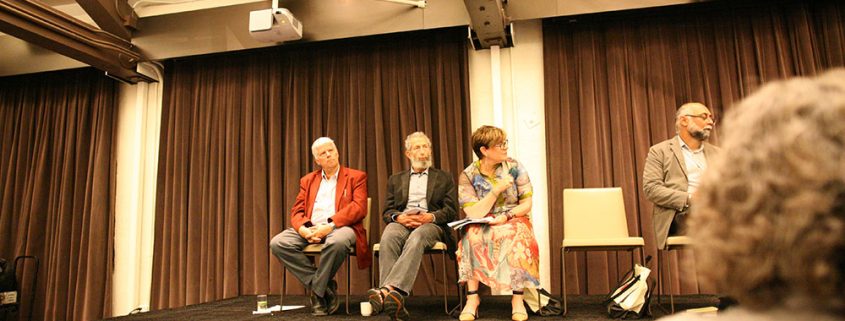Religious scholars examine gender, sexuality
Four academics discussed how faith shapes cultural and societal views on gender and sexuality at the “Gender and Sexuality: Engaging Sacred Traditions” event that took place at the USC University Club on Tuesday. The event is part of the on-going “Race, Faith, and Violence” series, which is hosted by the Institute of Advanced Catholic Studies, the USC Caruso Catholic Center, the Levan Institute for Humanities and Ethics and Our Savior Parish. “Race, Faith and Violence” aims to explore the impact that three major religions, Judaism, Christianity and Islam, have on global events and cultural as well as societal norms.
The panel featured Aysha Hidayatullah, a professor at the University of San Francisco; Sharon Groves, an Auburn Theological Seminary; Rabbi Reuven Firestone, the Regenstein professor at Hebrew Union College; and Pim Valkenberg, a professor at the Catholic University of America.
The event focused on the intersection between those religions and gender and sexuality, including feminism and the LGBTQ community. Speakers touched upon past views of gender and sexuality, and how they have evolved in contemporary society and the issues that are still present because of the way people interpret sacred text.
“Race, violence and faith is always an issue, has always been an issue from the time we have existed and will continue to be an issue,” Executive Director Samuel Paul said, urging the importance of these events for USC students and the community as a whole.
Hidayatullah spoke of how the interpretation of the Qur’an is being changed in favor of the feminist and LGBTQ movements.
She pointed out how the Qur’an is supposed to be an enduring text and that its interpretation, as long as it aligns with the core principles of Islam, should be valid.
It is this exceptionality that people of Muslim faith use in order to promote feminist and LGBTQ rights, according to Hidayatullah.
“Religion is animated by human context,” said Hidayatullah in reference to how concepts like patriarchy come about not only from the notion of religion, but that the culture of the time shapes the religion. Therefore, the context in which sacred text is interpreted is ever changing, she said.
“There’s a lot of talk, and for good reason, about the difficulty of accepting differences,” said Father James Heft, Alton Brooks Professor of Religion at USC Programs such as “Race, Faith, and Violence” help people recognize and respect others that are not like them, according to Heft.
Groves touched upon the attack in Orlando, Florida. For Groves, this event relates to religious pluralism, race and cultural difference.
Muslims who identify as LGBTQ are walking a fine line between both worlds and find it hard to choose either, according to Groves.
“Orlando woke people up to the work that still needed to be done. The country began to understand that anti-LGBTQ attitudes did not end with marriage protections for couples,” Groves said.
Firestone commented on the bipolar nature of Judaism and the Jewish people. He also discussed how more and more LGBTQ rabbis and women are being ordained even as some Orthodox Jewish communities find it against scripture.
“Today we find a range in Jewish practices, from the ultra-Orthodox that one would think has no connection at all to sympathies toward equality in terms of gender and sexuality, and then you have everything in the Jewish community that runs very much to the left,” Firestone said.
Valkenberg informed the audience on his experience with his female colleagues and their difficulties with certain aspects of the Catholic Church, such as ascending into leadership positions. He also expressed how important it is to study religion in order to understand the theological and institutional matters that concern and affect society.
“Please study [religion] because the future is in your hands,” Valkenberg said.

